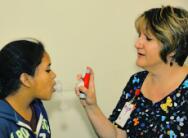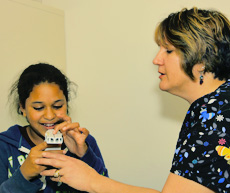Rex Healthcare Asthma Program Boosts Kids’ Confidence and Management Skills

Asthma attacks can keeps kids awake at night – coughing, wheezing and gasping for air. Asthma symptoms frequently interrupt sleep, disrupt school days, create panic and frequently result in trips to the emergency room. “It doesn’t always have to be that way,” says Jackie Choman, a respiratory therapist and certified asthma educator at Rex Healthcare. With the help of a three-year grant from the John Rex Endowment, Choman has played an integral role in expanding WE CAN, a school-based asthma education program, to reach an additional 762 children at 53 elementary and middle schools.
Teaching Techniques
“Education is a big part of the solution,” said Choman. “A lot of children and parents simply lack a thorough understanding of asthma.” Trained Rex staff, registered nurses, and respiratory therapists deliver the WE CAN program on site at schools in the mornings or afternoons based on what works best for each school.
Using hands-on demonstrations, creative teaching and interactive computer games, the WE CAN team teaches kids, ages 6 to 16, about common triggers, breathing techniques, and proper use of inhalers. They learn to identify their own triggers and manage flare-ups. “It’s something they may have to live with for the rest of their lives so the focus is on helping kids help themselves,” said Choman.
Classes are designed for 10 to 15 students but can accommodate as many as 20 students. Elementary school students participate in 45-minute sessions for six weeks, and middle school students participate in an abbreviated three-session program. The WE CAN team follows up with families for a six-month evaluation.
Boosting Confidence
The title of the program says a lot about its goals. WE CAN focuses on improving confidence by empowering kids with knowledge and action steps. “They truly can learn to manage their disease and be productive in school and at home,” said Choman. Kids enrolled in the program typically become more comfortable and knowledgeable of their triggers, prevention and management. According to a Rex Healthcare Foundation report about WE CAN, the percent of children reported to be very comfortable managing their asthma more than doubled from 37% at baseline to 77% at six months post-education program.
By reaching out to kids in a school environment, the WE CAN program capitalizes on a peer setting for learning. Since asthma symptoms can differ from one child to another, the group classes address common as well as hidden causes. “The kids help each other out,” said Choman. “They learn they’re not alone in solving their own personal puzzle to breathing easier.”
Increasing Knowledge
An asthma attack can be scary for kids, parents, teachers and any caretaker. Without proper education and reinforcement, they may not recognize triggers, early symptoms or remember what to do. “Some kids may have only received as little as a few minutes of instruction prior to the program,” said Liz Estell, a part-time employee in the health room at Turner Creek Elementary. “After a child is diagnosed at a pediatrician’s office, they may not have any other follow-up education opportunities so a school-based program makes a lot of sense.”
Estell personally interacts with kids who visit the health office, and her daughter is a previous WE CAN participant. The school nurse at Turner Elementary recommended they work with Rex to offer the program. “It helped tremendously,” said Estell. “I found a huge difference in our students’ knowledge – those who participated began to recognize their symptoms and would come into the office knowing what they
needed to do.” Estell also coordinated a teacher training with the WE CAN team to help raise awareness about asthma throughout the school.
needed to do.” Estell also coordinated a teacher training with the WE CAN team to help raise awareness about asthma throughout the school.
Improving Lives
 WE CAN is structured to help schools achieve goals developed by the National Asthma Education Prevention Program which include creating a healthy school environment, health services, asthma education, supportive policies and sound communication.
WE CAN is structured to help schools achieve goals developed by the National Asthma Education Prevention Program which include creating a healthy school environment, health services, asthma education, supportive policies and sound communication. Rex was able to expand an existing program into more schools while also evaluating the health outcomes of the children enrolled in the program. Using follow-up evaluations, Rex tracked results of the program and identified various improved asthma outcomes. The Rex Healthcare Foundation report about WE CAN, compiled from data collected April 2008 to December 2010, highlights numerous improvements in the health and well-being of the participating children, including:
- Avoiding Emergencies - Trips to the emergency room can become all too common for a child who is unable to control an asthma attack. However, program results indicate that a little education can go a long way in preventing emergencies. Based on information tracked in the WE CAN report, the number of emergency and unexpected doctor visits decreased among program participants.
- Sleeping Better - A good night’s rest is commonly recommended for a happier household and school productivity. Unfortunately, sleep disturbances due to asthma are a significant problem for many children. After completing the WE CAN program, children had a reported decrease in waking up with asthma symptoms – improving from 1 to 14 nights per week to no asthma related interrupted sleep.
- Reducing School Absences - Addressing asthma concerns at school gets right to the root of one particular problem since many kids experience school disruptions, leave early, or miss school days altogether as a result of their asthma. According to the Rex Healthcare WE CAN report, participants´ parents who reported missed school days due to asthma prior to the program decreased from 27% at baseline to 9% at a six-month follow up.

